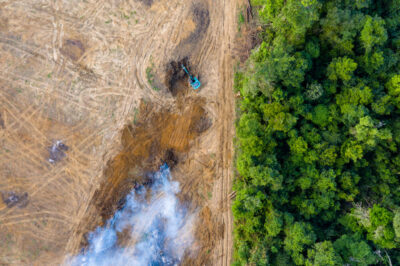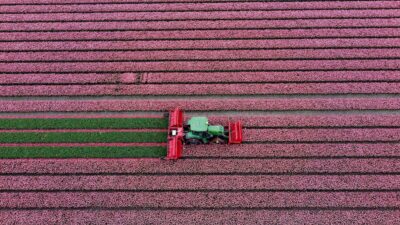Main content
Planetary Health is an increasingly important concept as humans continue to over-use earth’s natural resources, threatening global human health [1]. Even though high-income countries are responsible for the majority of challenges in planetary health, low- and middle-income countries (LMICs) can also develop solutions to build resilience and decrease their future contribution to global warming [2,3]. ‘Zorg voor Klimaat’ is a part of the ‘NTVG’ (The Netherlands Society for Tropical Medicine and International Health) and aims to inform medical professionals on Planetary Health and the interaction between Global Health and Planetary Health, in order to inspire and incite medical professionals to take action towards a healthier future for planet and people [4]. This article illustrates how medical professionals can contribute towards addressing Planetary Health challenges in low-income settings.
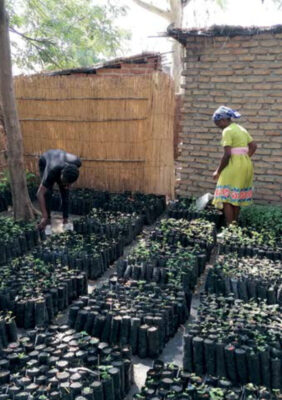
Specific strategies proposed to address planetary health issues in low-income settings include: investment in projects focused on reforestation, family planning, and building resilience among communities and disaster management [3]. Moreover, in low-income settings, medical doctors frequently engage in district management and leadership. They can initiate change by forming collaborative networks with sectors like agriculture, forestry and education. This participation allows them to raise awareness and integrate planetary health and environmental sustainability into district health planning [1]. Global health and tropical medicine (GH&TM) and family medicine (FM) consultants are specifically trained to analyse and address health challenges by using a holistic and systematic approach. Moreover, they are equipped with leadership and educational skills, making them ideal candidates to address planetary health challenges in LMICs [5,6]. In order to inspire other consultants in LMICs, ‘Zorg voor Klimaat’ is sharing an example of collaborative planetary health initiatives established by a GH&TM consultant in the Mangochi district in Malawi.
Malawi is a densely populated country in Southern Africa with a population of 21 million people residing in an area approximately three times the size of the Netherlands [7]. The population of Malawi is experiencing the results of deforestation and climate change first-hand. The last couple of years have shown an increase in cyclones and natural disasters. Due to the latest cyclone, more than 500 people lost their lives and even more people lost their houses and farms. In addition, health facilities and roads toward health facilities were damaged, resulting in a reduced quality and accessibility of health care. Furthermore, fields were destroyed and fertiliser washed away, contributing to food scarcity and malnutrition [8]. Malawi has a fertility rate of 3.9 births per woman, contributing to a rapid population growth, resulting in additional pressure on the natural resources [9]. Mangochi District is one of the 28 districts in Malawi with a population of 1.3 million people. Most of the people in Mangochi District are dependent on farming and fishery. In this district, a series of interventions was initiated, aiming to address planetary health challenges.
Firstly, collaboration was sought with the medical educational sector where we successfully advocated adding planetary health to the curriculum for medical doctors in Malawi, using a lesson plan adopted from Blom et al. [10] in order to raise awareness of planetary health issues among future doctors. Also, during continuous professional development sessions for all hospital cadres, planetary health issues were included, outside the official curriculum in hospital teaching moments.
Another example of initiating change in collaboration with the community at a local level is the development of agroforestry nurseries with youth groups and the district governmental forestry department. These nurseries produce seedlings to replace lost forest areas. Forest areas mitigate the risk of mudslides, thereby reducing the risk of losing accessibility to health facilities. To foster sustainability and cost-efficacy, labour was provided by the community youth themselves, while critical materials to start agroforestry nurseries were provided by external parties. Each nursery is expected to produce at least 3000 tree seedlings annually with a financial investment of about 100 euros per site. The key in these reforestation activities is local awareness and community ownership, which contributes to proper selection of priority areas for reforestation and adds toward protection of planting sites. Apart from new agroforestry nurseries, other protection activities were initiated by the committees, including activities to control goats and cattle damaging the seedlings with barriers or restriction of cattle’s movement. Similarly, firebreaks, a gap in vegetation in order to slow or stop wildfires [11], were established to prevent damage from widespread bushfires and patrol activities were started to track and stop loggers from outside the villages.
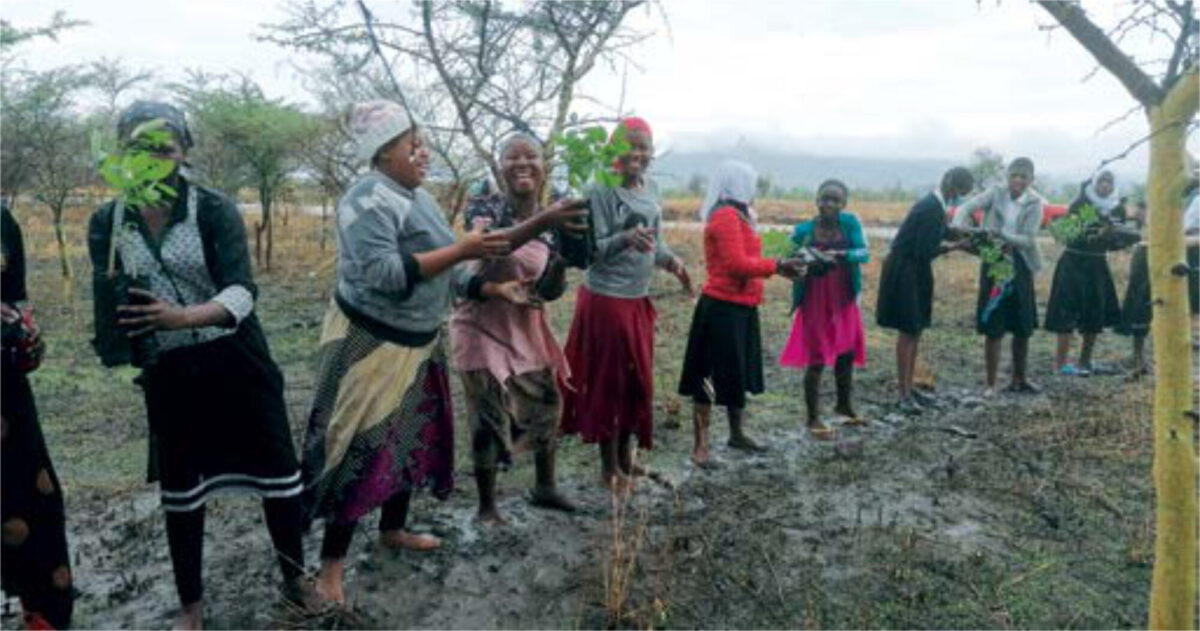
In order to reduce the felling of trees for firewood and charcoal production a collaboration with the agricultural sector was formed to investigate alternative local cooking methods. ‘Changu changu stoves’ were introduced in the same communities the agroforestry nurseries were established [12]. U-shaped stoves made from 21 local bricks and mud which can reduce firewood consumption at village level with sixty percent. These stoves were made locally and maintained by youths and built for every household in the village. The material cost for one stove is limited to 50 euro cents. The biggest challenge faced was the resistance to change of cooking methods. Therefore, communication skills and collaboration with community leaders was essential.
Another alternative for charcoal was explored. Eco-friendly charcoal briquettes production was started in the same communities, to compete with traditionally produced charcoal made from trees within the forest. Several methods have been described to produce eco-friendly briquettes, but for the Mangochi setting, a low-cost method using corn stalks was identified [13]. Corn is the staple food in Malawi. While the corn cobs are already used as firewood, stalks are normally burned on the fields. Stalks are very low in nitrogen concentration, making them inefficient for compost, and harvest will diminish if old stalks are left on the field. Partial burning of these stalks in old oil drums makes them suitable as the main component of charcoal briquette. An additional benefit of the production of eco-friendly charcoal briquettes is the income generating potential for the local community, as the briquettes can be sold in town. Both the fire-wood friendly stoves and the eco-friendly charcoal have the potential to reduce the need for logging, which would in turn reduce the risk of mudslides.
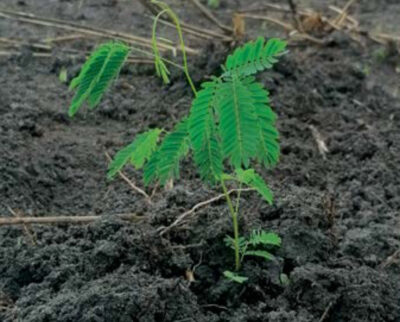
Finally, to increase resilience and address food insecurity and malnutrition due to poor harvest, an initiative was launched in collaboration with the agricultural sector and forestry department to promote locally made compost. In Malawi, artificial, subsidised fertiliser is distributed among selected population groups by the government. However, the timing of fertiliser distribution and the amount of fertiliser distributed varies from year to year. This often leads to a suboptimal crop yield, resulting in food insecurity and an upsurge in malnutrition cases. Whereas artificial fertiliser erodes soil quality in the long-term, compost prevents soil erosion, conserves water and improves soil quality, making the land more resilient for excessive rains and droughts, reducing the risk of food insecurity and malnutrition.
In all our activities, we also involved the educational sector. Local schools were involved in reforestation activities; students were taught about the need for forest protection with firebreaks, cattle control, alternative cooking methods, eco-friendly charcoal and the process of producing compost. Whenever the academic calendar allowed it, students and youth groups assisted in planting and creation of firebreaks.
Conclusion
Holistically trained medical health professionals with a focus on global health are better equipped to address the challenges of planetary health issues in the areas they are working, also in low-income settings. The examples from Malawi show such opportunities in increasing health and access to health facilities, occurring as a result of collaborations of health professionals with agricultural, educational and forestry sectors. Education and awareness, reforestation, exploration of alternative cooking materials, all can become solutions in planetary health problems we are facing -building on taking a holistic and wider approach to health issues.
References
- Whitmee S, Haines A, Beyrer C, Boltz F, Capon AG, de Souza Dias BF, et al. Safeguarding human health in the Anthropocene epoch: report of The Rockefeller Foundation–Lancet Commission on planetary health. The Lancet [Internet]. 2015 Nov;386(10007):1973–2028. Available from: https://www.thelancet.com/journals/lancet/article/PIIS0140-6736(15)60901-1/fulltext
- UNEP Climate Action Note | Data you need to know [Internet]. www.unep.org. Available from: https://www.unep.org/explore-topics/climate-action/what-we-do/climate-action-note/state-of-climate.html. [Accessed 18th August 2023]
- Ezeh A. Addressing planetary health challenges in Africa. Public Health Reviews. 2016 Nov 29;37(1).
- Zorg voor Klimaat [Internet]. 2023. Available from: https://www.zorgvoorklimaat.nl/over-ons/. [Accessed 22nd August 2023]
- Flinkenflögel M, Sethlare V, Cubaka VK, Makasa M, Guyse A, De Maeseneer J. A scoping review on family medicine in sub-Saharan Africa: practice, positioning and impact in African health care systems. Hum Resour Health [Internet]. 2020;18(1):27. Available from: http://dx.doi.org/10.1186/s12960-020-0455-4
- OIGT. Welkom [Internet]. Oigt.nl. [cited 2023 Oct 25]. Available from: https://www.oigt.nl/
- Countrymeters.info. [cited 2023 Oct 25]. Available from: https://countrymeters.info/en/Malawi
- Lutala P, Makwero M. Cyclone Freddy in Malawi: Reflections from a primary care perspective. Afr J Prim Health Care Fam Med [Internet]. 2023;15(1). Available from: http://dx.doi.org/10.4102/phcfm.v15i1.4142
- Fertility rate, total (births per woman) – Malawi [Internet]. World Bank Open Data. [cited 2023 Oct 25]. Available from: https://data.worldbank.org/indicator/SP.DYN.TFRT.IN?locations=MW
- Blom IM, Rupp I, de Graaf IM, Kapitein B, Timmermans A, Sperna Weiland NH. Putting planetary health at the core of the medical curriculum in Amsterdam. Lancet Planet Health [Internet]. 2023;7(1):e15–7. Available from: http://dx.doi.org/10.1016/s2542-5196(22)00316-3
- Gonzalez-Mathiesen C, March A. Developing guidelines for increasing the resilience of informal settlements exposed to wildfire risk using a risk-based planning approach. In: Understanding Disaster Risk. Elsevier; 2021. p. 159–78.
- Fuel-efficient cookstoves in Africa [Internet]. Ripple Africa. [cited 2023 Oct 25]. Available from: https://rippleafrica.org/project/fuel-efficient-cookstoves-in-malawi-africa/
13. Akvofoundation. How to make charcoal briquettes from agricultural waste [Internet]. Youtube; 2009 [cited 2023 Oct 25]. Available from: https://www.youtube.com/watch?v=LqI63IEg3MM

















































